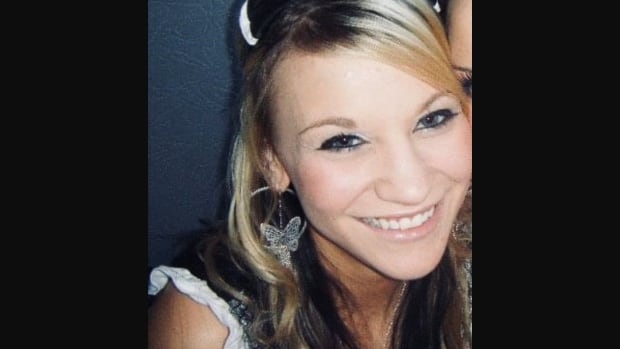
The death of an Edmonton woman, allegedly at the hands of the man she was trying to leave, has prompted calls for stronger support for victims attempting to flee intimate partner violence and improved judicial systems to rehabilitate repeat offenders.
The body of 32-year-old Aylissa Rovere was found on a rural property west of the city in mid-September, days after she had been reported missing by family.
Collin Boucher-Gionet, who has been charged with second-degree murder and indignity to human remains, is a repeat offender who was on probation at the time of the alleged killing.
He remains in custody. He has yet to enter a plea, and is due in court again Friday.
Experts say the case is a reminder of the need for improved supports for victims attempting to flee intimate-partner violence. They say it also demonstrates an urgent need for judicial reforms to better manage and rehabilitate repeat offenders to break the cycle of recidivism.
When he was arrested in Rovere’s killing, Boucher-Gionet, 34, was on probation for threatening to kill a woman he considered his foster mother in August 2023.
Pre-sentence reports for his previous convictions show Boucher-Gionet has a history of family violence and has struggled with aggression and volatile personal relationships. He has had challenges with substance abuse and extreme jealousy and has shown “deep trust issues with women,” the documents show.
Temitope Oriola, a University of Alberta criminologist, said the case illustrates how the courts often fail to manage the risk offenders can pose. He said it points to a “constellation of organizational failures” that fall short of rehabilitating repeat offenders before they are released into the community.
“As a system, we need to do better … in terms of how we respond to individuals with such lengthy criminal activities and backgrounds,” Oriola said.
“We still do not do as good a job as we should with respect to the kinds of social services that an individual such as this would require.”
Dan Jones, associate chair of justice studies at NorQuest College and a retired Edmonton police officer, said the case demonstrates the need for judicial reform.
Before they are granted release or probation, offenders should be more carefully assessed based on the severity of their convictions, the length of their criminal records and the likelihood of reoffending, Jones said.
“We expect them to come out better than they went in,” he said. “And I think that’s the system’s failing.”
The judicial system often overlooks the root causes of criminal activity and falls short on rehabilitation efforts, including therapy, counselling and treatment, Jones said.
“The people we like to perceive as monsters in society — they’re created by their backgrounds.”
At least three times, Boucher-Gionet was ordered to undergo counselling.
Records show he completed a 12-week rehabilitative program for offenders who have committed violent crimes. He also sought substance abuse counselling following his first conviction, and was open to further therapy.
But nothing in his court record reflects how much counselling he has received to date.
Rovere was last seen on Sept. 6. Her body was found the following week when police searched a home in Parkland County, about 40 kilometres west of downtown Edmonton.
RCMP arrested Boucher-Gionet in a stolen vehicle on the evening of Sept. 17.
Oriola said the circumstances of Boucher-Gionet’s traumatic childhood history, detailed in his court record, are all too common among prolific offenders, many of whom are shaped by trauma that fuels their recidivism.
Better managing the lives of offenders after they serve their sentences — including housing, employment and mental-health needs — can help break the cycle, he said.
“They were oftentimes victims of violence before becoming perpetrators of violence themselves,” Oriola said. “That becomes a vicious cycle.”
‘Promise, promise’
Friends and family members say the troubled relationship between Rovere and Boucher-Gionet had recently ended.
Jodi Dunn said her daughter had moved out of the trailer the couple shared and met someone new. But she feared Aylissa — a fragile and forgiving person — would return to the relationship she had left.
She said her daughter and Boucher-Gionet had dated years ago and that she was concerned when they reconnected several months ago. She said she had repeatedly begged her daughter to leave Boucher-Gionet.
“I would say, ‘Promise, promise.’ And she would say, ‘No, I’m not going to go back to him. I’m not going to go back.’
“We all talked to her but he had some hold over her and I don’t know what it was.”

Dunn said she remains haunted by an altercation between Rovere and Boucher-Gionet on July 21 of this year. Police were called to the home the couple shared.
After that night, Rovere sent her mother photos that showed her arms and legs covered with bruises, her right eye ringed with black.
Court records show Rovere was charged with uttering threats and two counts of assault against Boucher-Gionet.
RCMP confirmed there had been an investigation but declined to provide further details, telling CBC they don’t comment on domestic assault calls. The charges against Rovere were withdrawn following her death.
Dunn hopes that sharing her daughter’s story will help domestic violence victims find the strength to escape. She also hopes it will help ensure that survivors are believed.
“Love should never hurt, and if it starts hurting, you’re in the wrong relationship,” she said.
“You’ve got to be brave enough to get out of there.”
‘I disowned him’
Boucher-Gionet’s criminal record, including documents unsealed at CBC’s request, sheds light on his troubled past.
In a case where charges were ultimately stayed, Boucher-Gionet was accused of assaulting his former partner, the late Britanny Sagan, and her close male relative in April 2018.
He was charged with assault with a weapon, aggravated assault, carrying a weapon dangerous to the public, and attacking a man with a propane tank. The charges were stayed in May 2019.
The Alberta Crown Prosecution Service said it was not in a position to proceed with the prosecution because “key witnesses were uncooperative.”
Most recently, Boucher-Gionet was convicted of uttering death threats against Lillian Kuervers in August 2023.
Kuervers had been a caregiver to Boucher-Gionet. She took him into her home when he was 15 after he befriended her son. He lived with her for years. Court records describe her as his foster mother but the arrangement was informal.
She said she had been trying to help Rovere break free of her relationship with Boucher-Gionet and had taken her in temporarily this past summer after one of their fights.
Kuervers said that as the years passed, her relationship with Boucher-Gionet had become strained.
The night in 2023 when he threatened to kill her was the end, Kuervers said. She said the incident unfolded in front of several family members.
“I disowned him in that moment,” she said in an interview. “I will never call him my son again.”
In a victim impact statement, Kuervers said she lived in a constant state of fear following the threats.
“Your actions hurt this household terribly,” she wrote in the statement. “Certain sounds have my granddaughter in tears. We now lock everything tightly. You terrorized us for months.”
In November 2023, Boucher-Gionet pleaded guilty to threatening Kuervers and was sentenced to 18 months’ probation. He was ordered to be on good behaviour and to undergo treatment, including anger management counselling.
Assault convictions
Boucher-Gionet was 19 in September 2009 when he was charged with assault with a weapon following an attack on his stepfather.
Convicted the following year, he was sentenced to 7½ months of time served in pretrial custody, followed by two years of probation. He was ordered to undergo anger management therapy and domestic violence counselling.
According to a pre-sentence report, Boucher-Gionet said he got into a drunken argument with a family member and held his hand to her throat. When he returned home the next day, he got into a fight with his stepfather and stabbed him in the chest.
According to the report, Boucher-Gionet said he and his stepfather had many previous conflicts, including one on his 18th birthday when he tried to break up a family fight.
In the report, he recalled how he jumped on his stepfather’s back, put him in a sleeper hold, bit a piece of flesh off his ear and kicked his head. The incident did not result in any charges.
Escalating risk
Jan Reimer, with the Alberta Council of Women’s Shelters, said family and domestic violence often escalates.
Perpetrators exhibit a pattern of abusive behaviour where they exert control over the victims, When that control slips, the danger increases.
“We know that when women leave an abusive relationship or say they’re going to leave, it escalates their risk of being killed,” Reimer said.
She said supports are available but front-line and social services, including housing, employment and health care, are overtaxed and victims frequently fall through the cracks.
Deadly cases of domestic violence remain all too common and the shelter system continues to strain to meet the demand, she said.
Between 2009 and 2022, according to Statistics Canada, 18 per cent of victims in solved homicide cases had been killed by an intimate partner.
“It’s so challenging for women to leave abusive relationships,” Reimer said. “There is so much that’s stacked against them.”
A troubled upbringing
A pre-sentence report prepared for court after the 2009 assault on his stepfather details Boucher-Gionet’s difficult childhood, which was marked by frequent moves and exposure to violence and substance abuse in the family home.
He spent much of his early years away from his biological parents.
Boucher-Gionet, born in Timmins, Ont., described repeatedly witnessing violence in the home as a child and trying to protect his sister as they hid together in closets.
The pre-sentence report found Boucher-Gionet had a long history of alcohol and substance abuse. It noted a history of “anger and violence” and anti-social behaviour, and said he had intense and volatile relationships.
“He believes that after witnessing violence toward his mother, he became strongly opposed to violence toward women,” the report said.
An assessment contained in the report determined he was a high risk to reoffend.
In August 2013, Boucher-Gionet was convicted of assault. A pre-sentence report described him as remorseful, but noted that he blamed his short temper and the man he had assaulted for “initiating the offence.”
The report recommended that he complete anger management and addictions counselling. He was sentenced to 18 months’ probation.
Honouring Aylissa
On a Thursday in late September, an intimate funeral service was held at the Church of Jesus Christ of Latter-day Saints in Spruce Grove, Alta., west of Edmonton.
Images of Aylissa Rovere — smiling with friends, embracing her children — flashed across the room, above a closed casket lined with pink.
Delivering her eulogy, Jodi Dunn recounted some memories of her youngest child, a “little princess” with a gifted voice who performed living-room concerts for her family.
A generous girl with an infectious giggle, Aylissa loved Cinderella, Sailor Moon and anything pink. She grew up to be loyal and selfless, a devoted mother who loved to make others laugh.
But behind her smile, and her signature sunglasses, she was hiding trauma, severe anxiety and regular panic attacks that made everyday life difficult, Dunn said.
She faced hard times but always leaned on the escape of a favourite song and the love of her children to help her through, Dunn said.
“She didn’t live life without its challenges,” she said. “She had many, but she tried very hard to keep going and through and show her children the right way.”
Dunn said she takes comfort in knowing Aylissa is now safe. She pictures her in heaven, singing.
“All the challenges she had, they are now gone,” she said.
“No one can hurt her anymore.”